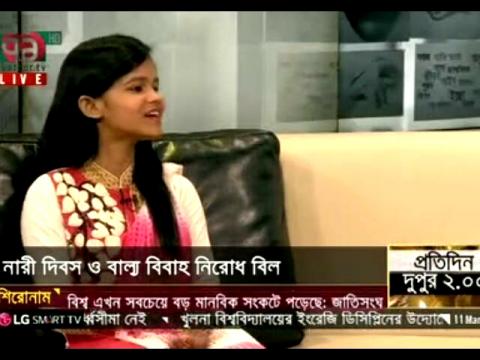Child activists challenging Child Marriage

By Shabira Nupur, Deputy Director-Advocacy and Justice for Children, World Vision Bangladesh.
I remember a 12 year old boy telling me that when he was conducting research with his peers many people in the community did not want to share their views with him during the data collection. They thought it was not worth sharing information as those conducting the research were ‘just’ children.
This situation showed me how our society perceives children and how people undervalue the participation of children. Many people still think that a child is just a child, which means they are not considered full human beings with all the rights entitled to adults and as a result, they are prevented from sharing their opinions and are not heard accordingly.
Bangladesh and most of the countries in the world have ratified the Convention on the Rights of the Child, which outlines children’s right to participation as one of the four core principles. Article 12 and related articles indicate that countries need to make every effort to ensure that children’s voices are heard within formal and informal systems and structures. However, the reality is far from these international standards and there are a lack of policies and practices that enforce and enhance child participation.
Despite these discouraging scenarios, boys and girls are standing up to claim their rights and to gain spaces to ensure that decision-makers, community members and parents hear their voices.
This week, Sayma, a 16 year old advocate, was invited to join as a panellist in a talk show at the Ekattor National TV channel in Dhaka, Bangladesh. Sayma, together with two renowned female activists to discussed the newly passed Child Marriage Restraint Act 2017. This invitation was remarkable recognition of the abilities of children and young people to understand their lives and contexts and to contribute their ideas to high-level debates.
I was personally astonished at Sayma’s confidence to deliver the key messages and her in-depth knowledge on the topic. She represented her peers that had been investigating this issue and are well prepared, more so than many adults. The way she shared her thoughts and views amazed everyone who was watch the TV programme. After the talk show, we received a call from the host who told us that many people from the public called them to comment positively about Sayma’s contributions.
Through this TV show, Sayma proved that children are fearless, brave, intelligent and prepared to speak out. They can change people’s mind-sets and beliefs if they are equipped with the appropriate skills, tools and guidance. I am confident to say that our team at World Vision are doing exactly the right things and we are responding to the demands of children who want to be supported to make their voices heard at all levels.
We will continue to work to enable children to participate and make their voices heard. We are seeing the results of this process as children are growing in confidence and self-esteem. They are running their own advocacy campaigns on issues such as violence, child marriage, child labour, child budgeting, etc. They are leading an intergenerational dialogue with local, national and global policy-makers with the aim to influence key decision-making processes. And they are doing this successfully.
About the author
Shabira Nupur is the Deputy Director-Advocacy and Justice for Children with World Vision Bangladesh. She is a passionate child rights advocate and strongly promotes the participation of children as one of the key paths to achieve the well being of all children.